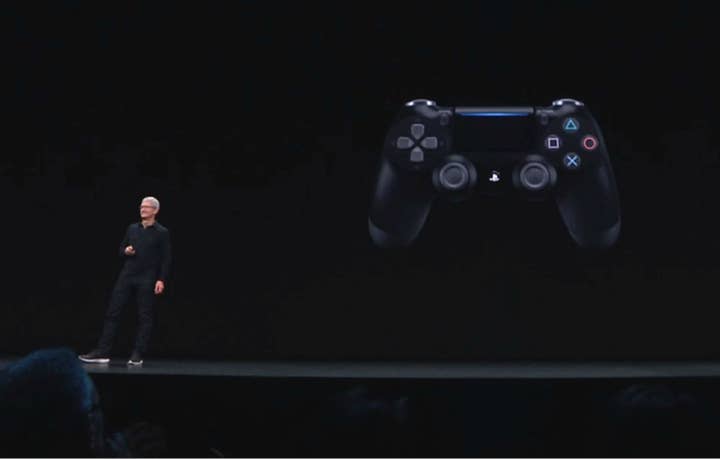Are we witnessing the end of the console wars? | Opinion
Sony and Microsoft's controllers appearing onstage at an Apple keynote speaks to a new landscape where former rivals are working together
The competitive landscape that underlies the entire gaming industry is shifting at a pretty dramatic pace. Remember how once upon a time, Mario and Sonic appearing side by side -- Mario & Sonic at the Olympic Games, specifically, a 2007 Wii title tying in with the following year's Beijing Olympics -- seemed like the exclamation point at the end of an era, a resoundingly final confirmation of the new industry status of two formerly implacable rivals?
Lately, those moments feel like they've been coming thick and fast. Sony is working with Microsoft on cloud gaming services. Cross-play between platforms is edging towards becoming standard. Microsoft bought Minecraft, and promptly doubled down on its support for other manufacturers' platforms. And there are fairly substantial rumours flying that the Xbox game streaming service will be available on Nintendo's Switch, perhaps even on Sony's hardware.
"There's an understanding that the real competition for gaming isn't from other platform holders"
This week brought another striking image which confirms that the platform wars as we've known them for over a decade are all but over. At the keynote presentation at Apple's WWDC developer event, the firm announced new controller support for its Apple TV and iOS devices, promptly illustrated with images of the Xbox One and PS4 controllers. Soon you'll be able to pair Sony and Microsoft's ubiquitous gamepads to an Apple TV, an iPad or an iPhone and play games directly on the device -- a move that, one imagines, must have come with the blessing of the respective platform holders.
The substantive impact of this change will be significant for many users, of course -- especially in terms of the large back catalogue of older console titles which have been ported to iOS and will be vastly more functional with the help of a decent controller. It might also be a decent shot in the arm for gaming on Apple TV more broadly, which had some promise at the outset. The devices are very popular and surprisingly capable as a gaming platform, but they have been seriously hampered by a number of issues, including somewhat unenthusiastic backing from Apple itself and the lack of a decent standard controller.
When games first appeared on the system, Apple spent a while insisting that every title had to be controllable with the Apple TV's remote. This rule was dropped relatively quickly but did a fair bit of damage to the gaming potential of the diminutive box nonetheless. The capacity to link up an Xbox or PS4 controller to the Apple TV doesn't fix all the problems, but it should at least draw some much-needed attention to a gaming ecosystem that's got a surprising array of decent quality titles.
"This is only the tip of the iceberg, with all parties having a far more in-depth partnership in mind down the line"
Beyond that immediate, practical implication, however, the really interesting thing about that announcement lies in the optics. Apple using the giant screen at one of its biggest annual keynote opportunities to display images of iconic hardware devices from Sony and Microsoft is a hell of a trip, when you think about it. It encapsulates nicely the fact that all three of these companies, though ostensibly rivals, are now cooperating on gaming-related endeavours in multiple different ways.
It's perhaps a little premature to declare the era of the console wars over entirely. No doubt there will continue to be some rivalry over exclusive titles and so on, but there's a growing acceptance that the market has room for many different visions of gaming platforms and services. Moreover, there's an understanding that the real competition for gaming isn't from other platform holders. Rather, it's from other forms of entertainment entirely, with the challenge for all gaming companies being first and foremost to ensure that their offerings are more appealing and compelling than the likes of Netflix, YouTube, or countless other types of media competing for audiences' attention.

Given the nature of that challenge, it's not hard to see why Microsoft and Sony would find it appealing to work with Apple in this way -- and it's almost certain that this is only the tip of the iceberg, with all parties having a far more in-depth partnership in mind down the line. I've argued in the past that the most important question gaming platform companies need to ask and answer isn't, "How do we reach gamers?" - the 50 million, 100 million, or perhaps even 150 million engaged consumers of console titles -- but rather, "How do we reach the next 50 million?".
Sustaining and building upon the market growth of the games industry is an ongoing and vitally important challenge. In this context, the ability to use Apple's devices as a gateway could be crucial to unlocking new opportunities. Apple TV itself is something of a quiet story; in the line-up of many other firms it would be considered a solid success, but in Apple's catalogue it's overshadowed to the point of near-oblivion by other products. Combined with iPad and iPhone, though, this seemingly minor new deal attaches Microsoft and Sony's controllers to games on devices vastly more ubiquitous than any console platform in history.
Right now, that might just mean that you can play retro console ports and a handful of well-made original titles on iOS with a better controller than before -- but it's hard to imagine that this isn't a key step towards Microsoft and Sony's game streaming services also being available on those devices. That's where the real appeal must lie; turning all those hundreds of millions of devices into potential trojan horses for gaming services, just as they once were for the disruption of the video media market by Netflix and its ilk.
I remain fairly convinced that game streaming services aren't going to make much of an impact on the existing gaming market for significantly longer than a lot of pundits seem to expect. For people happy to pay hundreds of dollars for a console upgrade in order to enjoy high-quality gaming experiences, the appeal of streaming is hard to fathom and the infrastructure to meet their exacting demands just isn't there. For less engaged audiences, however, the ability to play the big new Xbox or PlayStation game everyone is talking about on an iPad or an Apple TV sounds like it could be a pretty major step for the industry as a whole.
If that approach can be made to work, it could grow the pie significantly for everyone, and that's something far more important than squabbling over who gets which slice. For that possibility, it's no wonder that Microsoft, Sony and Apple are willing to work together. Whatever rivalry continues to exist between those companies is, as it must be, secondary to the goal they all share -- ensuring that the market for games continues to grow healthily for a long time to come.






.jpg?width=291&height=164&fit=crop&quality=80&format=jpg&auto=webp)

